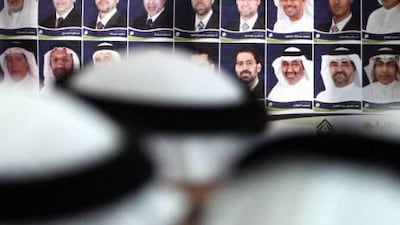MANAMA // Sunni Islamist parties seen as close to the government suffered a major defeat in Saturday's election, as independents and the main Shiite opposition party increased their representation in the lower house of parliament.
Ali Ahmed, the deputy leader of Al Menbar National Islamic Society, described the results as "not good" for his party.
"I think people need new personalities. Maybe it's hard to be an MP in Bahrain more than once or twice," Mr Ahmed said yesterday.
The final result of the elections will not be known until a second round of voting on Saturday in nine constituencies, where no candidate won at least 50 per cent of the vote.
The country's two main Sunni Islamist parties have already lost at least five seats in the 40-seat house. Were they to lose all second-round contests, their representation could be slashed from 15 to just three.
"Inshallah, all of our five candidates involved in the second round will succeed," Mr Ahmed said. Al Menbar, a Sunni party with ties to the Muslim Brotherhood, held seven seats in the last parliament.
Some analysts believe the government is supporting independent Sunni candidates rather than the Islamist parties because they are easier to control and do not insist on banning alcohol.
"I don't think the government backed our opponents. It was fair and didn't support any party," Mr Ahmed said. "This is the will of the people." Bahrain's other main Sunni Islamist party, Al Asalah, held eight seats in the last parliament. Three of the Salafi group's candidates lost their seats and two more will go to the second round of voting.
"The election was a little hard," said Adel al Maawdah, a member of Al Asalah in the last parliament who kept his seat after running uncontested. He believes the two Sunni parties suffered losses because they failed to form a single slate of candidates. Instead, they ran against each other in some races, diluting their voting strength.
"We used to help each other and strengthen each other," Mr al Maawdah said. "The lack of co-operation was a good opportunity for individuals."
Pro-government independents gained at least two seats and will contest several more in the next round. Mr al Maawdah said their success will weaken the parliament because "they are not strong".
"Some of them just paid money for votes," he said.
The independents disagree. Othman Sharif al Rayes, an independent who took a seat held by Al Menbar, said the influx of independents will give parliament "more professionals with a variety of specialities such as business".
Parliament's main opposition group, the Shiite-dominated Al Wefaq National Islamic Society, gained one new seat, giving it 18 representatives in the next house.
"We won all 18 seats in which we had candidates," said Abduljalil Khalil Ebrahim, one of Al Wefaq's winners. The group will be the only Shiite representatives in the next chamber, despite making up around two thirds of the population. He said the government "should redistribute the districts for fair representation".
Mr Ebrahim said the most important development was the loss of seats for the Sunni Islamist parties.
"The Sunnis did not achieve what they expected. This is because of the mood on the Bahraini street," said Ubaydli Ubaydli, a local political analyst. "The two Waad candidates in the second round, this is a big surprise for everyone. If any of these two find their way to parliament, it will be a big factor".
The National Democratic Action Society, a liberal group that is known by its Arabic acronym Waad, had a strong showing in the polls and will fight for two constituencies in the second round. If both candidates succeed, the opposition could hold half the seats in the 40-member house.
One of the candidates, Munira Fakhro, said: "I'm not so optimistic, but we will try our best."
Mr Ebrahim believes both Waad candidates will struggle as they received slightly fewer votes than their main rivals in the first round and the votes for candidates placed third in their districts might go to their competition. "The challenge now is to convince those voters to vote for them," he said.
One woman, a pro-government independent, held her seat when she ran uncontested in a sparsely populated Sunni area. Ms Fakhro is the only other woman remaining in the contest.
The election was the third since the constitution was established in 2002. It has been criticised for a host of reasons, including the government's decision to ban international monitors, exclude addresses from voting lists and set up general polling stations where citizens can vote outside their district.
"I think there are many vague areas in this election - points of concern," said Abdulnabi Alekry, the chairman of a local monitor, the Bahrain Transparency Society. "I cannot say it is fair."

